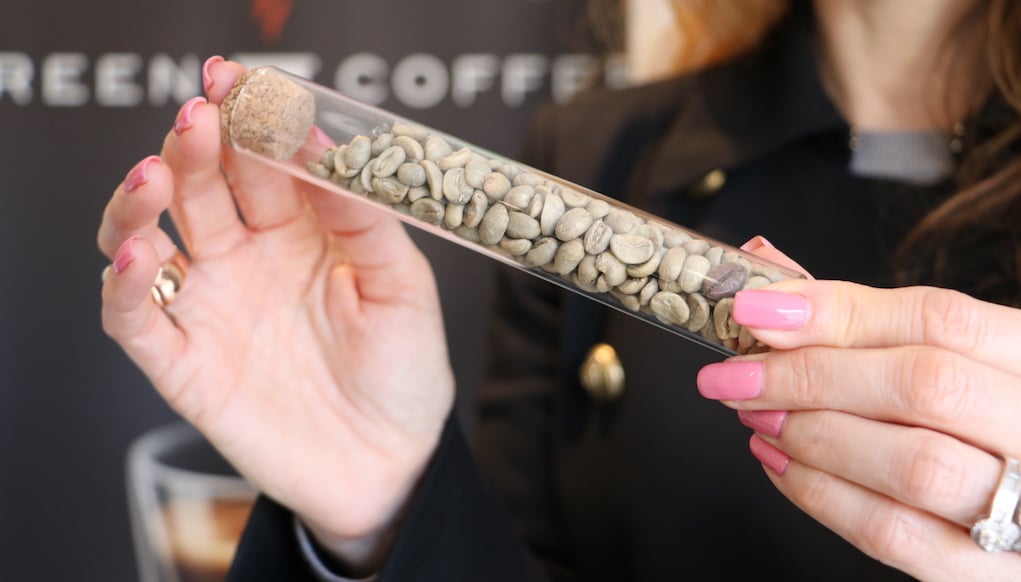How green coffee is helping to save the planet

The future of fashion could be hiding in your coffee cup! In Monaco, fashion designer Alex Giannotti has launched a clothing collection made from recycled coffee grounds to help fight against plastic pollution. Also committed to helping the environment is Green Coffee Monaco, a startup working to reduce the use of aluminium capsules and promote their green coffee packed with antioxydants.
Nestled in the Annociade quarter of Monaco, this artist’s workshop is an aesthetic haven. An eclectic collection of books line the walls, offering insights into art, fashion, minimalism and more. Carefully decorated, the room is brought to life with stitching and thread, in shades of beautiful azure, brightening up the workspace. Here, in this oasis of creation, Alexis Giannotti designs his collection of eco-friendly clothes, each piece modern and comfortable and all made from natural fibres.
Using merino wool is no surprise, but coffee ground fibres are now part of our clothes! “It is the fruit of two year’s of research,” explains this entrepreneur, passionate about reducing the damage that textiles do to the environment. “Finding an alternative to plastic fibres is more important than ever. During every wash-load, clothes release many microplastic particules, which end up in our oceans.”
I think that within the next few decades, cotton will be used much less when making clothes as it requires far too much water
Alexis Giannotti, designer

>> READ ALSO: Are young people key to fighting ocean plastic pollution in oceans?
The future of fashion in your coffee cup
Brought to life with a 3D printer, the fashion designer created these coffee fibre jumpers from organic waste: recycled coffee grounds. “It is crucial that we recycle these materials in order to reduce our energy consumption when manufacturing clothes,” says this coffee lover. Today, fashion is one of the world’s most polluting industries. “I think that within the next few decades, cotton will be used much less when making clothes as it requires far too much water”.
Additionally, a huge advantage of using coffee fibres is that they allow the skin to breath meaning they help prevent against bad odours, “unlike unnatural fibres which tend to hold onto them – a nightmare!”.
There is one downside though. These coffee grounds can only produce clothes in their natural colour: charcoal grey. Alexis Giannotti is hoping to find a way to dye the material to match his brand’s signature shade, “Betty blue, similar to the blue invented by Yves Klein, a shade I hoped to dedicate to my grandmother, who supported me in all my projects, as well as to the Mediterranean waters.” A challenging dream she hopes will one day come true!
Green coffee packed with antioxydants
Founded in 2020 and located in the Condamine area of the Principality, the young business Green Coffee Monaco is taking on two challenges of their own. Not only do they want to reduce coffee drinkers’ carbon footprints, but also spread the word about the benefits of green coffee: small, unroasted, khaki-coloured grains. Bursting with antioxydants, these beans just need boiling water and a healthy drink is ready to go.
Rarely recycled, several billion aluminium capsules are dumped in landfills every year
Carina Luis y Prado, founder of the startup Green Coffee Monaco
As for the capsules of roasted coffee on offer here, they are made of organic materials, in particular sugarcane, complete with a paper lid on top. “These capsules are 100% biodegradable. After being used, they completely disappear within the space of twelve weeks,” explains Carina Luis y Prado, founder of this eco-friendly Monégasque coffee brand.
An alternative to aluminium capsules
This Spaniard, who spent her childhood in Argentina, has always had a passion for coffee and her tastes regularly change with every new one she tries. A classic part of Latin American culture: “growing up, my mum used to make me milk with a little bit of coffee, instead of a hot chocolate,” she tells.

A regular drinker of ristrettos, a highly concentrated espresso coffee, she makes sure to buy organic products whenever she can. For her, not only is this a healthier choice, but also one that is better for the environment. By selling her products at affordable prices, she hopes to encourage her customers to do their bit in the fight against the rising levels of pollution.
According to British newspaper The Guardian, 20 billion individual coffee capsules are used worldwide every year. “Rarely recycled, several billion aluminium capsules are dumped in landfills every year,” details Carina Luis y Prado, before going on to talk about an even more worrying situation: the red mud produced during the production of aluminium.
“Drinking a cup of coffee may be a small, everyday affair, but it actually has a huge impact,” she concludes, whilst praising the Principality for becoming more sustainable year on year.
>> READ ALSO: Meet the superfoods revolutionising Mediterranean menus









